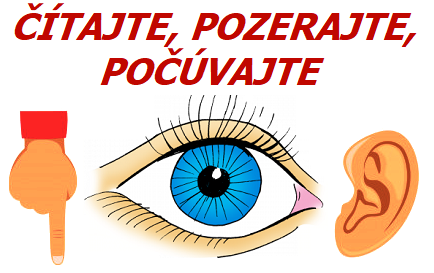22 Kniha – priateľ človeka - BOOKS – OUR FRIENDS :)
Vytvorené: 18. 10. 2014 Tlačiť
a) Books – variety/how people choose where and when they read
Books have always played an important role in human lives. In books, we can experience new things and with an active imagination, we can go to other worlds or made up worlds. Books can change human lives. Reading can make us more intelligent. Without reading we wouldn’t know anything that we know today. Books are filled with knowledge, helpful topics about life and helpful advice. One can read about romance, the creation of the world, future events, and big battles that mankind has fought. Without books we wouldn’t know anything about other cultures, extinct animals, important historical events, scientific studies and fascinating research. Books help us to have critical thinking skills, teaches us how to perform task, helps us plan for our future, perform jobs better and solve problems. We can buy books in a wide range of bookshops, for example in big shopping centres, in bookstalls or in small specialized bookshops. An e-book is a book in electronic form which can be bought in internet bookshops. We can also borrow books from a library. Children usually start reading picture books and fairy tales. The children’s books by Hans Christian Andersen and the Brothers Grimm are loved by many generations of children. Teenagers and young people usually read adventures, science fiction, romances or novels. Adults choose detective stories, historical novels, and books of travellers or biographies. Some people enjoy reading poetry. These days books translated from different languages are very popular in Slovakia because Slovaks want to improve their language skills.
b) Favourite author, genres
We distinguish fiction and non-fiction books.Fiction books deal with information or events that are not real, but imaginary. There are two types of fiction books: poetry and prose. To give an example of fiction, we can mention short stories, novels, science fiction or westerns.
Non-fiction books are based on reality and true facts. Types of non-fiction include textbooks, dictionaries, encyclopaedias, biographies, autobiographies, essays and memoirs.
One of my favourite writers is Charles Dickens. He was born near Portsmouth in 1812. He was the second of eight children. The Dickens family, although was not poor by the standards of the time, lived through a series of financial crises. Charles was sent to school at the age of twelve, where he did well, and at the age of fifteen he began to work in the office of a legal firm. He began his writing career in 1836, when he started working for London Chronicle as a Reporter. The Pickwick Papers was Dickens's first novel. This book is considered to be Dickens's greatest novel. Charles Dickens wrote a lot of novels. His masterpieces are Oliver Twist, Nicholas Nickleby, David Copperfield, Little Dorrit and Great Expectations. Charles Dickens wrote about ordinary people, whose life he knew very well. Dickens worked very hard and died at the age of 58.
c) A book I have read by an author from an English-speaking country
My favourite book is Oliver Twist by Charles Dickens. Charles Dickens described the effects caused by the industrial revolution through Oliver, a young orphan boy. Oliver is born in a workhouse in the first half of the nineteenth century. His mother dies during his birth, and he is sent to an orphanage. Together with the other orphans, Oliver is regularly beaten and poorly fed. He walks up to the the cruel authoritarian, Mr. Bumble, and asks for more. For this impudence, he is put out of the workhouse. He then runs away from the family who take him in. He tries to find his fortune in London. Instead, he falls in with a boy called Jack Dawkins, who is part of a child gang of thieves. This gang is run by Fagin. Oliver is brought into the gang and trained as a pickpocket. When he goes out on his first job, he runs away and is nearly sent to prison. However, the kindness of the person who was robbed, saves him from the terrors of the jail, and instead he is taken into the gentleman's home. As soon as he thinks he is settled, Bill Sikes and Nancy (two members of the gang) takes him back. Oliver is once more sent out on a job. This time he is helping Sikes with a burglary. The job goes wrong and Oliver is shot and left behind. Once more he is taken in by the Maylies, the family he was sent to rob. He spends a wonderful time with them. Unfortunately, Fagin's gang comes after him again. Nancy, who is worried about Oliver, tells the Maylies what is happening. When the gang finds out about Nancy's treachery, they murder her. Meanwhile, the Maylies reunites Oliver with the gentleman who helped him out earlier and who turns out to be Oliver's uncle Mr. Brownlow. Fagin has been arrested and hanged for his crimes and Oliver settles down to a better life. Mr. Brownlow later adopted Oliver as his son.
d) Nobel prize winners for literature and their work
Every year, the Swedish Academy awards the Nobel Prize for Literature to the writer whose work is considered to be a unique. Winning the Nobel Prize is one of the highest honours for a writer. The most famous holders of Nobel Prize in literature are Jean-Paul Sartre, Lev Nikolajevič Tolstoj, Anton Pavlovič Čechov. Rudyard Kipling, who was awarded the Nobel Prize for Literature in 1907, was the first winner of the prize from the British Isles and was also the first English language writer to win. He is perhaps most fondly remembered for his children’s stories, such as The Jungle Book.
e) Crisis in reading fiction (reasons, do people buy books, services of libraries and institutes)
It is said that we face a reading crisis these days. It starts with parents who are busy and don´t have time to read with their children. They rather place their children in front of TV or a computer and their children form a constant habit. Therefore it is very important to develop a good relationship towards reading and literature already from early childhood. There are several reasons why people prefer watching film instead of reading books. Reading a book takes more days or weeks, watching a film just one or two hours. People do not have to concentrate and imagine things because everything is on the screen.
There are two main reasons why Slovaks don’t buy so many books. The first one is that books are getting more and more expensive and people cannot afford them. This also leads to illegal photocopying. Students prefer copying to buying expensive textbooks .Slovak libraries lack finances to be able to provide better choice of books. The second one is that people do not look for information in books as much as they used to do in the past. They look up the information on the Internet what is much faster.
![]()
· Simulácie z fyziky· O Slovensku po slovensky· Slovenské kroje· Kurz národopisu· Diela maliarov· Kontrolné otázky, Domáce úlohy, E-testy - Priemysel· Odborné obrázkové slovníky· Poradňa žiadaného učiteľa· Rýchlokurz Angličtiny. Rozprávky (v mp3)· PREHĽADY (PRIBUDLO, ČO JE NOVÉ?)Seriály:· História sveta (1÷6)· História Slovenska (1÷5)· História módy (1÷5).
Členstvo na portáli
Poznámka pre autora
Copyright © 2013-2026 Wesline, s.r.o. Všetky práva vyhradené. Mapa stránky ako tabuľka | Kurzy | Prehľady |






